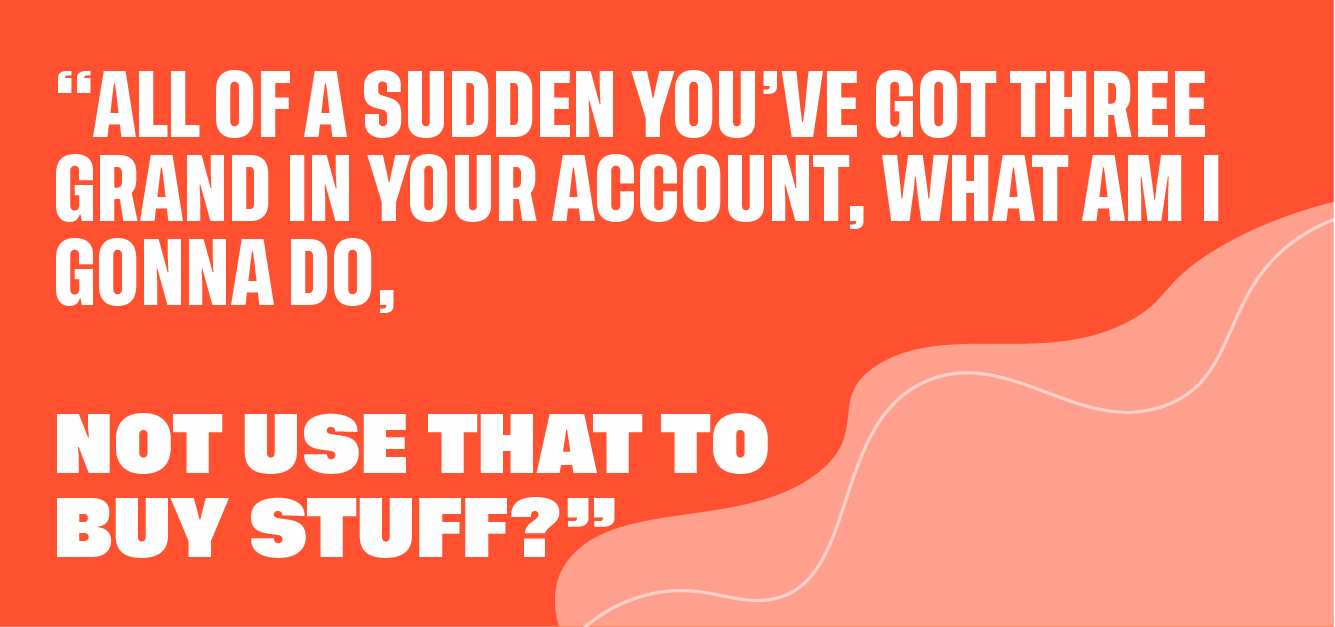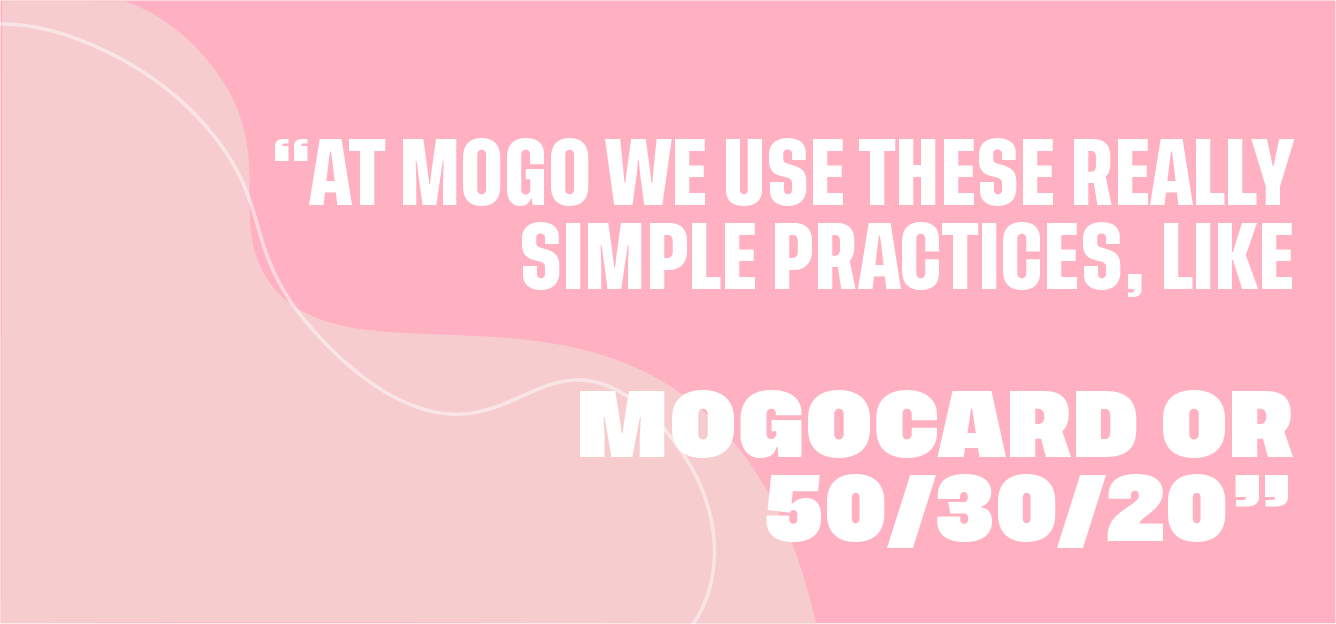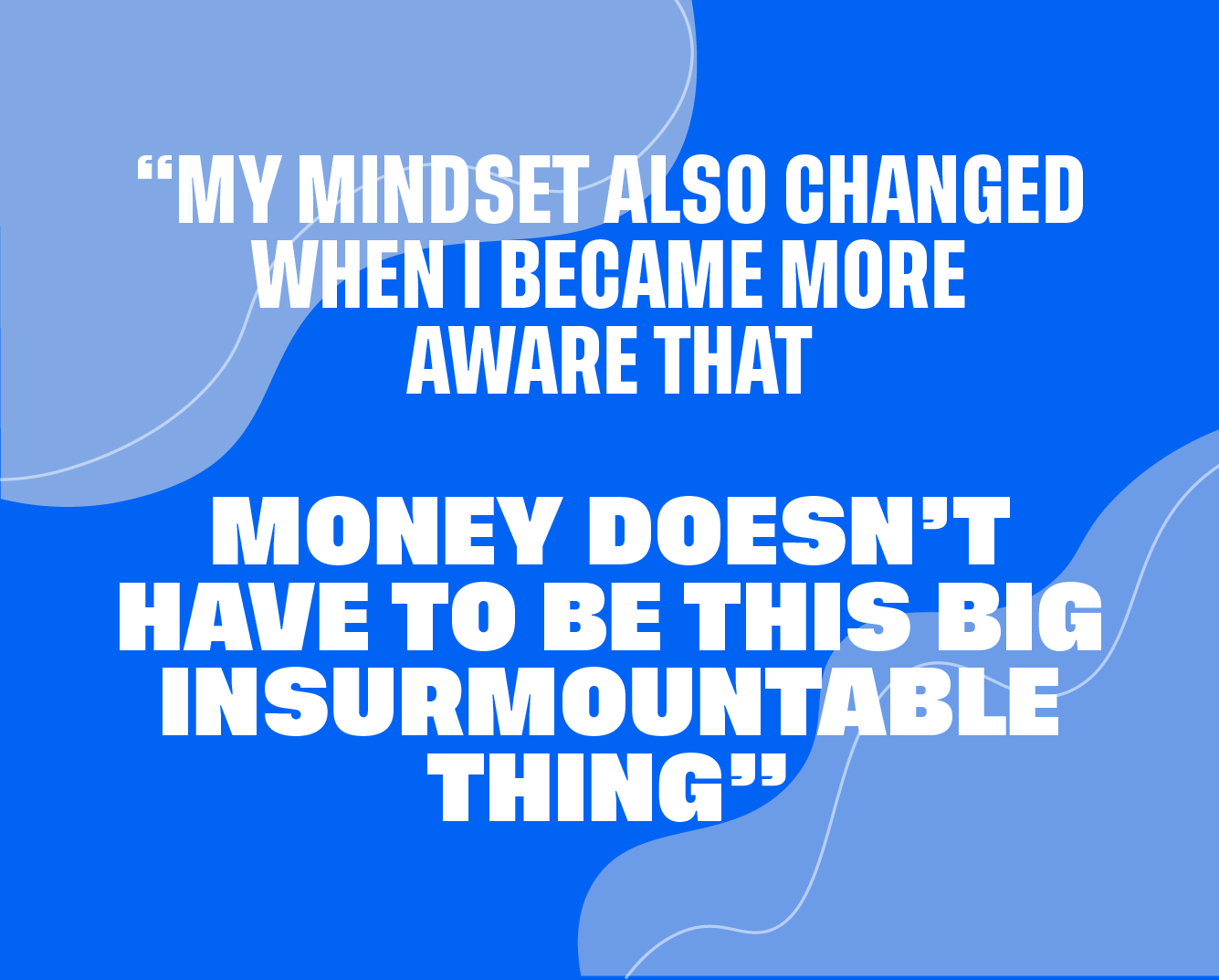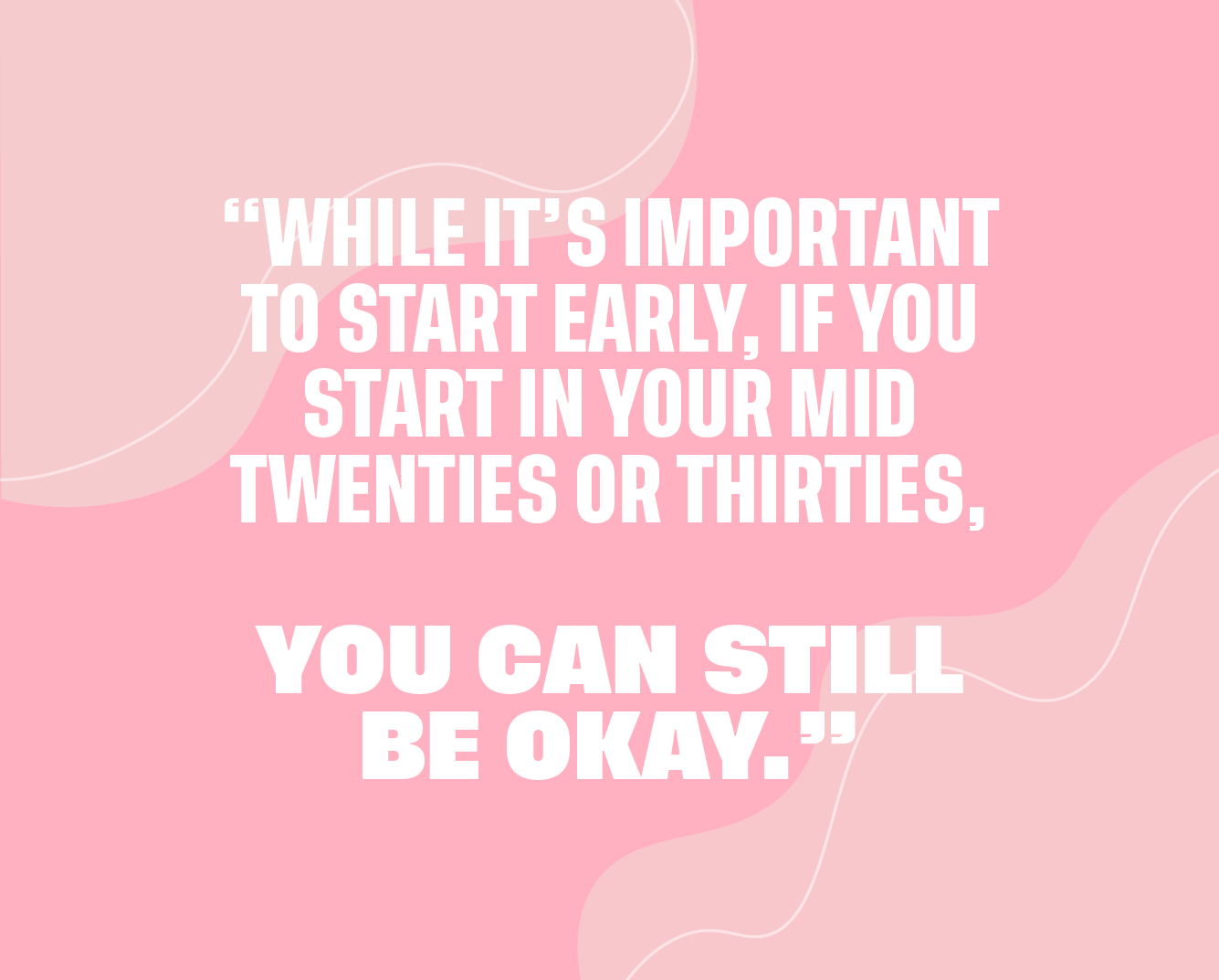Millionaire Mondays with Stacy Kim
Stacy’s relationship with debt has been a bummer at times, but she’s on track to pay down her student loan before she hits 30. Read about the budget that finally worked for her!
This interview is part of a lightly chaotic series where Megan, a writer, discusses millennial financial goals with her peers and their strategies to get there. Spoiler: we all want to be millionaires.
In this conversation: student loans (including some hard numbers), real talk about being financial dumb-dumbs, and the point of inflection that helped Stacy lock down her finances.
——————
Megan: Hi Stacy. Identify yourself.
Stacy: I hate this already! I’m Stacy, I am a social media and content specialist here at Mogo. I’ve been here for about six months.
M: Did you know anything about finances before y—
S: Absolutely not.
M: Good. How would you have described your level of financial literacy before joining Mogo?
I’m treating the beginning of your work with Mogo as an inflection point because I know you personally and I think it was a big cool event in your life.
S: Yeah, for sure. I would say before joining Mogo and starting to learn about my finances, my attitude towards money was… nothing.
I was doing the bare minimum. I was scared, and lazy, and lackadaisical, I would say.
M: Lackadaisical is quite a common feeling, I would suspect—you’ve got a lot on your plate and you just don’t have time to develop a strict financial plan or habits. But what do you mean by lazy or scared?
S: Naked and afraid, like that Discovery show. Uh, I think I felt aware that money is really important; you need it to survive, it kind of rules your life. But learning about how to manage something so important was really intimidating. I felt too lazy to try to tackle all of that, it just seemed unmanageable.
M: So maybe less laziness and more feeling overwhelmed?
S: Yeah, I think that’s fair.
M: Paint me a picture of your finances before you got a handle on them (if you’ve got a handle on them).
S: In high school, financial literacy was not stressed enough. My parents would just tell me to save. So I’d like, put $5 in my savings account when I’d get paid from my minimum wage job at Aeropostale, I guess?
And that kind of continued. I went to school, got some student loan debt, got a higher paying job, but just kept kind of treading water. I wasn’t destitute, but I wasn’t disciplined enough to feel confident in my finances, I guess.
M: You weren’t in crisis mode, so you felt like that was an okay place to be for a while. I get that.
S: Yeah, I was putting big sums on my credit card but I would always pay off way more than I could afford to pay off, if that makes sense. I’d do more than minimum payments, you know, but then I’d run out of cash and use the credit card again. I was always in some debt, and that weighed on me.
M: Tell me about your debt! We hate debt! Let’s bash it!
S: Yeah! So my credit card debt is under control now, but my student loan still friggin’ sucks. I made so many mistakes with my student loan.
M: Why did you need a loan?
S: I couldn’t pay for tuition myself, and my family didn’t have an RESP for me to use.
M: And what kind of loan was it?
S: It was a combination federal and provincial loan.
M: How much did you have to take out?
S: It was a loan for every semester for 3.5 years, three semesters per year. I had a scholarship for my first year.
M: Were they intended to cover your living costs, too?
S: Okay well here’s the funny thing… I don’t know.
I just applied for these loans, I didn’t really understand them. There was a forgivable, like, “grant” portion of the loans, too. And the best piece of advice I got was from a coworker that said listen, my biggest regret is spending the grant money.
Because that was the only really “free” money. But it was just dropped into my account. And I would spend it. I could have saved it and then used it to pay back the loan. But obviously I used it.

M: Would you be comfortable sharing how much you have to pay back on your loan, and what your principal balance was?
S: So I still owe about $20,000.
M: What was your principal?
S: It was $47,000.
M: Oh my god. That’s a lot of money.
S: Yeah. Hate that! Hate to see it!
M: So you’ve paid down over half, though. That’s huge. You graduated in 2017, right? That’s a big deal. What was your strategy?
S: Same strategy as my credit card before—put as much as I possibly can from each paycheque on to the loan. But this was only possible because I live at home with my parents. I’m an adult woman and I live at home. I lived alone in an apartment for about two years before I moved back here, so I still have paid a lot of rent and a lot of money for dumb groceries and stuff, but I’ve been back here for just over a year now.
I want to say this loudly because I hate those stupid articles where it’s like a “self-made” millionaire or like “I paid down my student loan in 2 years” and they’re like “yah my parents gave me $500,000.”
So full disclosure: I live with my Ma.
M: Why?
S: I like it here.
M: Cool. So you don’t pay rent, basically. You’re able to chuck a consistent portion of your income onto your loan. The rule of thumb I’ve seen is that ideally, you’ll only pay 30% of your net income into housing. Where does that 30% go for you? Do you use it to pay down your loans, too?
S: I used a modified 50/30/20 rule because my needs don’t take up that full 50%. So I can opt to bulk up my savings portion, slotting a bit of extra cash into that 20%, or if I’m feelin’ cheeky I’ll buy a dumb thing, bulking up the 30% for “wants”. I just find I need to have a base number, that 20%, to work from.
Otherwise my saving can be really inconsistent.
M: When will you have your loan paid off?
S: I think it’ll be about 3 years still.
M: That’s a pretty great vibe. You’ll be student loan free by 30, if you can keep this pace. That’s lit.
S: It’s good but I also still hate it.
M: How do you decide what to put on your loan monthly?
S: I am a huge proponent of the 50/30/20 budget that I learned about when I joined Mogo.
M: Say what that is out loud for the record and for all the people in the back.
S: That’s the budget where 50% of your income goes to things like rent and food, “needs,” and then 30% goes to fun stuff, and then 20% goes to financial goals. So that 20% is what I’m using to pay off my credit card when it carries a balance and my student loan.
M: Was it easy to start budgeting?
S: I hate budgeting. I hate it. My friend’s boyfriend sat with me for like an hour and made me an Excel budget. And I used it for a week and then just forgot about it.
But when I started at Mogo, I was like, okay I need to know something about finance in order to do this job well. So I became aware of some of these ideas and principles that applied to me. But I still didn’t take any action.
And then one day it sort of started clicking. Like, oh, I can actually understand this.
My experience to that point had just been like, everything to do with finances is so opaque.

So the more I learned even passively just by doing my job, the more these concepts took shape for me.
Also, like, I said it. I’m plugging it! I’m plugging the MogoCard. I use it. I started using it because I wanted to get to know our products and offerings. But then it… started working for me.
M: How so?
S: Well, it tells you via push notification how much money is left in your account, for one thing, after you make a purchase. And honestly, I’m scared of it declining in public, so I’m always sure how much is on there and how much I have, in saner moments, decided I can spend.
M: Whaddya mean?
S: Like it reminds me to take a second before I buy a jacket that I want or something. And I think, oh. I don’t actually need that right now.
M: You can’t really give yourself the excuse of not knowing how much money you have left.
S: Yeah. And honestly, like, it’s an uphill battle still. Because the COVID-19 relief measures have gone away, my loan interest rates are back up to full, and I owe interest on the student loans as well as the credit card balance. And it’s hard to make strong payments on both of those things.
But I feel really confident that I’ll get my credit card to zero and then I’ll just use the MogoCard. Then I’ll just have the student loan to focus on.
M: What was the point of inflection for you? How would you describe the point you found this new financial trajectory?
S: I just became more aware. And bit by bit it became less scary.
But I also realized that the easiest way to pay your bills and debt down is to just be paid a fair wage. I was underpaid for so many years—like really underpaid, even in roles where I had titles like Account Manager—that being brought up to a fair benchmark changed my relationship with money. Which is stupid. People should just be paid more.

I always felt like, oh, my friends are in debt and miserable so it’s normal that I am too. But that was dumb! And now I feel a lot better.
It’s not that I have reached all my financial goals and everything is fine and done now, but I feel confident knowing I can continue to achieve my new goals as time goes on.
M: Stacy.
S: Megan.
M: What’s your number?
S: My number. The number I want to retire with. It’s something million. I forget the calculation.
M: Figure it out or I’ll bully you.
S: That was hell. I hate math. So my number is $2.2M by the age 58, and $6M by age 68. Because I still have to pay down my loan, I can’t start this full plan for another three years or so.
M: That is a ton of money. How?
S: Well I’m 25 right now. I have a lump sum in savings that I skimmed when the pandemic relief measures were in place (also coincidentally when I couldn’t go out into public to buy my dumb little things) of $15,000.
So with that as my base, and putting away 20% of my income into the S&P 500 (which is $975 per month), I should, according to the super geniuses in the internet, be able to retire with a couple mill in the bank.
M: Did you think that was a thing you’d do in your lifetime? Be a million—no, be a multimillionaire?
S: I mean it hasn’t happened yet, but having a clear path forward is pretty wild. Especially because I actually understand this path; I know why I’m investing my savings in this way. That feeling of confidence gives me a lot of comfort.
—————
As soon as Stacy’s loan goes away, she will walk outside and flip off the structures that burden so many university students with crippling debt (to say nothing of our neighbours to the south!). Then, she’ll get on with saving for a happy, healthy retirement. That’s the vibe, Stace!
An outtake from our interview I felt it necessary to include:
Stacy: Um, so my number is like six million, which I still am having trouble grasping as like a reality, because I know it's going to be pretty high at this point when I retire. Cause I'm only, I'm only 25.
But starting early, that whole friggin’ thing like—I remember my cousin, he was saying that he started saving money when he was like 12 years old. Like saving his allowances. He was like, I wouldn’t spend it because I was saving for the future. And I was like, okay, well, I wasn’t a narc when I was 12, I just spent it.

You don’t have to save your allowance as a child in order to live comfortably in retirement.
Don’t be like Stacy in college. Be like Stacy now. (◀️ Said by Stacy verbatim.)
Save your money like a smarty pants with a good budget (like but not necessarily our 50/30/20 budget), and stick to it.
| CHECK OUT MONEYCLASS |
This blog is provided for informational purposes only, is not intended as investment advice, and is not meant to suggest that a particular investment or strategy is suitable for any particular investor. If you’re unsure about a particular investment or investment strategy, you may wish to obtain advice from a qualified professional. Nothing herein should be considered an offer, solicitation of an offer, or advice to buy or sell securities. It’s also important to remember that past performance is no guarantee of future results.
MogoCard means the Mogo Visa* Platinum Prepaid Card. * Trademark of Visa International Service Association and used under licence by Peoples Trust Company. Mogo Visa Platinum Prepaid Card is issued by Peoples Trust Company pursuant to licence by Visa Int. and is subject to Terms and Conditions, visit mogo.ca for full details. Your MogoCard balance is not insured by the Canada Deposit Insurance Corporation (CDIC).